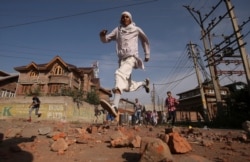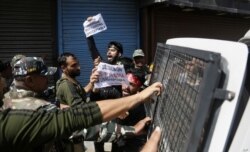Pakistan's prime minister urged the international community Friday to intervene in Indian-controlled Kashmir and prevent a war between nuclear neighbors India and Pakistan.
"What is going to happen when the curfew is lifted will be a bloodbath," Imran Khan told the U.N. General Assembly of the situation in Kashmir, which has been under an Indian-imposed curfew and communications blackout since Aug. 5.
That is when India revoked Article 370 of its constitution, ending the special status of Jammu and Kashmir. The security crackdown on the Muslim-majority territory has led to a dangerous escalation between the neighbors.
Khan warned that Kashmiris would not accept their new fate, potentially drawing the neighbors into war.
"If this goes wrong, you hope for the best, but be prepared for the worst," Khan said in an at times impassioned hourlong address to the assembly.
Pakistan's stance
He said he was not threatening a war, but the world must take seriously that it could be a possibility if Pakistan is forced to either "surrender" or "fight for freedom."
Speaking a short time before his Pakistani counterpart, Indian Prime Minister Narendra Modi made no mention of the situation in Kashmir, but he did speak about terrorism.
"It is absolutely imperative that the world unites against terrorism, and that the world stands as one against terrorism," Modi told the assembly.
Modi's U.N. appearance was his first since his government won a second term in May.
India has taken the stance that Kashmir is a bilateral issue to be resolved with Pakistan but has resisted engaging in any talks.
Outside the United Nations, large dueling protests supporting and opposing India's action in Kashmir took place Friday.
Khan said the United Nations is the guarantor of Kashmir's self-determination through its numerous Security Council resolutions and it must not give in to India. He demanded that India lift the curfew and release all political prisoners.
"And then the world community must give the people of Kashmir their right of self-determination," he said to applause.
Leaders, including U.S. President Donald Trump, have urged the two nations to open a dialogue.
U.S.-China trade dispute
China's foreign minister warned that tariffs and trade disputes could upset the global economy.
"They may even plunge the world into recession," Wang Yi told the assembly. He said China would never be "cowered by threats or subdued by pressure."
Washington and Beijing are in the midst of protracted trade negotiations and each has imposed billions of dollars in tariffs on products from the other's country.
"Regarding economic and trade frictions and differences, China is committed to resolve them in a calm, rational and cooperative manner, and is willing to demonstrate the utmost patience and goodwill," Wang said. "Should the other side act in bad faith or show no respect for equal status or rules in negotiations, we will have to make necessary responses to safeguard our legitimate rights and interests and to uphold international justice."
The next round of bilateral trade talks is set for the second week of October, White House economic adviser Larry Kudlow told reporters Friday.
Russia bashes US
Speaking Friday afternoon, Russia's foreign minister said the United States had attacked international law, citing the Trump administration's withdrawal from the Iran nuclear deal and the Intermediate Range Nuclear Forces (INF) treaty; its counterterrorism operations in Syria; and its unilateral decision to recognize Jerusalem as Israel's capital in violation of U.N. resolutions.
"We are now facing the attempts to add Venezuela to the list of countries whose statehood was destroyed before our eyes through aggression or coups inspired from abroad," Sergey Lavrov said.
The United States has said it no longer recognizes President Nicolas Maduro as the legitimate leader of Venezuela and has put its support behind opposition leader Juan Guaido, the National Assembly president.
Lavrov said "major success" had been made in "combating terrorism" in Syria, where Moscow militarily backs President Bashar al-Assad.
"Post-conflict reconstruction and creation of conditions for the return of the refugees can now be tackled," he said.






